COLORADO SPRINGS (RNS and NPR) — The door to the Colorado Psychedelic Church doesn’t look like much — a walkout basement to a home in an eastern Colorado Springs neighborhood.
Faux foliage dangles from the walls, a tabletop fountain trickles nearby, and on a recent Tuesday in May, about 20 people were seated on couches under dim green lighting, while soft meditative music filled the air.
At the front of the room sat Benji “Dez” Dezaval the church’s founder.
“Hey y’all,” said Dezaval, welcoming people inside with a big laugh, purple-tinted glasses and a shawl draped around his shoulders. “I’m glad we waited.”
This weekly guidance — one of many community events the church hosts in a given week — is not unlike a regular book club or Bible study. The evening’s conversation centers on this month’s theme: what it means to be maternal, timed to Mother’s Day.
A typical Tuesday meetup like this one might begin with some socializing over shared snacks brought by a congregant. Then the group settles in for a sermon, or lecture, followed by a conversation with reflections on the day’s topic. The meeting closes with an optional offering of psychedelics.
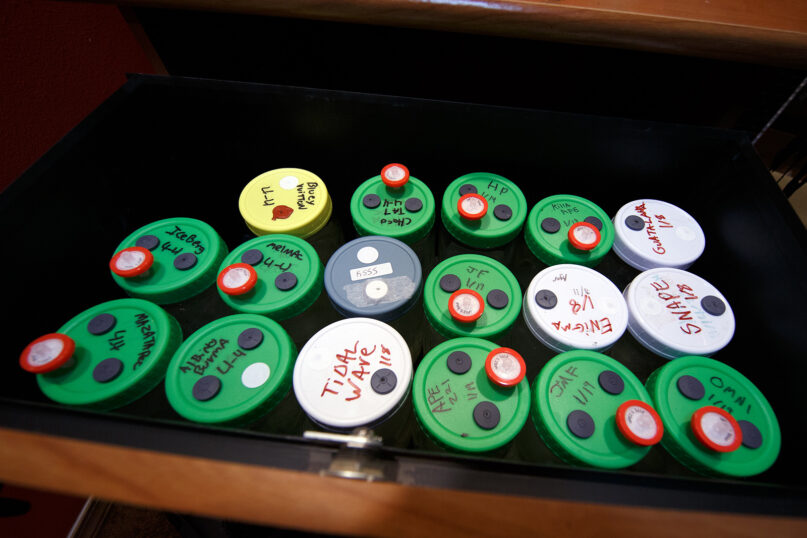
Multiple strains of psilocybin spores sit ready for cultivation at the Colorado Psychedelic Church, Friday May 30, 2025, in Colorado Springs, Colo. (Photo by Jeremy Sparig, for CPR News)
On this particular Tuesday, it was one puff of DMT, or dimethyltryptamine, a compound found naturally in some plants and animals, known for its short-yet-intense effects.
About a quarter of the group raised their hands, some regulars and others first-timers. Once everyone’s church membership card was checked — issued after completing a safety screening — a facilitator pulled out a small device resembling a vape pen.
The facilitator explained the instructions and said smoking DMT was different from cannabis. He held the pen to each person’s mouth to take a puff, pausing and counting to four before they exhaled, wiping the mouthpiece off with a cloth in between each congregant.
After everyone had received their gift, the facilitator thanked the group for sharing the time together. And for the next few minutes, in the quiet pattering of the rain outside, participants seemed to go inward, not speaking, some closing their eyes, while the congregants who chose not to participate chatted quietly with each other.
Lee Mead, 43, attends the church events regularly. He works in a nonprofit and moved to Colorado Springs from Houston last August, not knowing anyone. And within a week, he discovered the Psychedelic Church on the app Meetup and decided to show up
“It’s not just a bunch of people doing drugs in some guy’s dingy basement,” said Mead. “It is nice down here. And it is more about the community than the substances.”
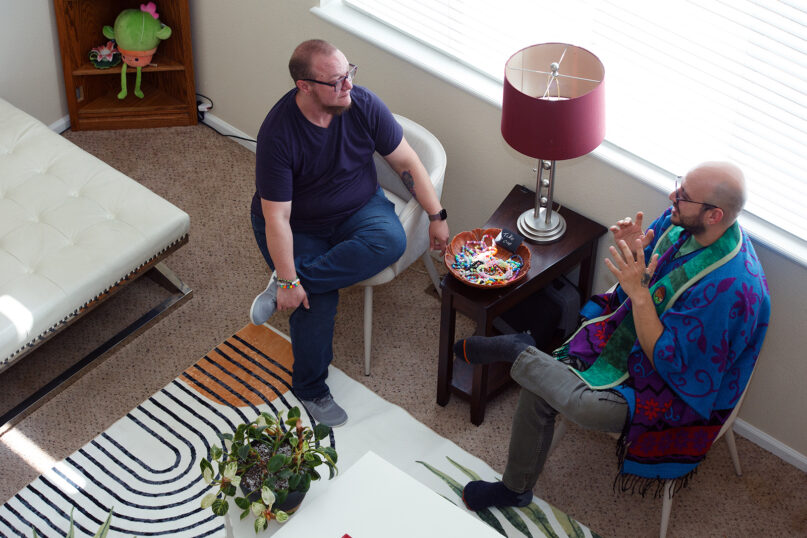
Lee Mead, left, and Benji Dezaval talk at the Colorado Psychedelic Church, Friday, May 30, 2025, in Colorado Springs, Colo. (Photo by Jeremy Sparig, for CPR News)
One night after taking psilocybin, the drug found in magic mushrooms, during what congregants call “revelry” — or an altered state of consciousness — Mead had a panic attack as he was coming back to reality. The stress of his job and a deeper unhappiness came rushing to the surface, he said.
And that’s when strangers stepped in and stayed with him.
“People that had just seen me maybe three times here at the church carried me through that,” Mead said. “Which of course made it even worse because I was receiving love that I didn’t feel I was worthy of.”
Mead didn’t touch psychedelics for months after that experience, but he never stopped showing up to the church gatherings.
“I hadn’t felt that level of care and level of love for a long time,” Mead said.
The Colorado Psychedelic Church, founded in 2024, describes itself as a spiritual community that uses psychedelics in communal settings. The church offers a range of gatherings throughout the week, including one for women, for men and for queer folks, plus a weekly lounge night for all in the community. The church also hosts classes and occasional themed gatherings. People gather in Dezaval’s basement, and they can choose whether to partake in the psychedelics. They see these substances not as recreational drugs but as a form of medicine that provides spiritual or emotional healing.

The Colorado Psychedelic Church, Friday May 30, 2025 in Colorado Springs, Colo. (Photo by Jeremy Sparig, for CPR News)
“There’s revere the self, and that’s the first universal truth. And we do that primarily through self care, making sure we’re actually actively maintaining ourselves. The use of natural medicine is a large part of that,” Dezaval said, explaining one of the church’s values.
“The second one is to embrace the communal experience to come together,” Dezaval said. “And the last, that the universe provides.”
Counseling is provided before, during and after revelry by Dezaval and other facilitators to help individuals make sense of their experience. Some facilitators and congregants also have medical training, according to Dezaval.
Before taking a dose at the church, people go through a safety screening, Dezaval added, ensuring they are over 21 and don’t take any medications that could interact dangerously with psychedelics, like some antidepressants. They also are required to complete training that explains the effects of the psychedelics and how to navigate the experience.
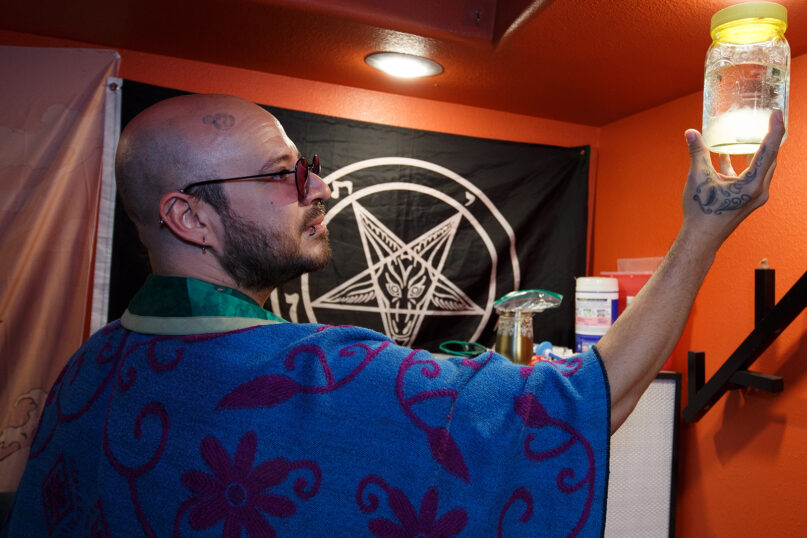
Benji Dezaval examines psilocybin spores at the Colorado Psychedelic Church, Friday, May 30, 2025, in Colorado Springs, Colo. (Photo by Jeremy Sparig, for CPR News)
Although DMT is illegal under federal law, Colorado decriminalized certain psychedelics in 2022. Since then, therapy clinics have popped up across the state.
The state’s regulated program requires licensed facilitators in a therapeutic setting, for instance, to oversee preparation, facilitation and integration after. But informal settings, like the psychedelic church, are not regulated.
Under Colorado’s Proposition 122, adults 21 and over may legally grow, possess, consume and gift naturally occurring psychedelics for personal use without requiring a license so long as no money is exchanged.
The congregation is funded through donations, according to Dezaval.
Don Lattin, a veteran reporter and author of “God on Psychedelics,” told RNS that federal scrutiny often focuses on whether a group has ongoing membership, screens out recreational users and upholds spiritual practices.
“The laws on this are vague and subject to the whims of the DEA,” Lattin said via email, but regulators have historically been more accepting of churches that “attempt to select only those who are serious” and “turn away would-be recreational users or thrill seekers.”
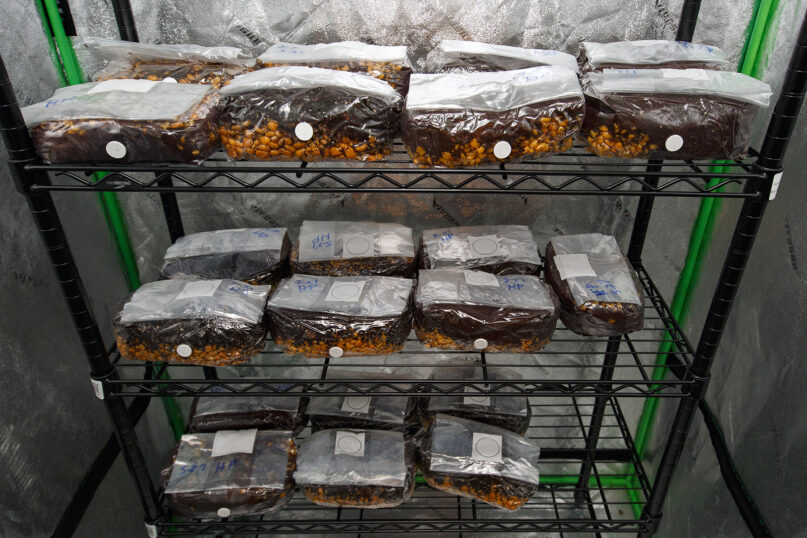
Pslocybin mushroom cultivation kits are stored at the Colorado Psychedelic Church, Friday May 30, 2025 in Colorado Springs. (Photo by Jeremy Sparig, for CPR News)
One way to distinguish a legitimate psychedelic church from a dispensary, Lattin said, is by looking at intention, structure and consistency.
“One of them, Sacred Garden Church, appeared to me after months of participatory reporting to be a sincere attempt to explore the spiritual dimensions of the psychedelic experience in a responsible group setting,” Lattin said. “The more notorious Zide Door Church of Entheogenic Plants seemed like a thinly veiled mushroom dispensary.”
Dezaval, the Colorado Springs church leader, maintains that his goal is to help people through the healing power of psychedelics. “If I was doing anything illegal, if this was all about the drugs and this is all about the money, why would I have any of these conversations?
“I understand the skepticism and I invite people in, so I can say like, ‘Let me show you every nook and cranny so you can see there is no secret,’” Dezaval said.
Congregants must partake of the DMT onsite, but they can take psilocybin home with them, and Dezaval acknowledges they may end up sharing the substance with friends who are not part of the community and have not gone through the training or safety screening.
“That’s gonna happen,” he said, adding that he tells congregants, “Don’t give them this without the information to make it safe.”
“Because without safety information, these tools are weapons and that weapon can only hurt somebody,” he said. “It’s not, ‘I gave you this — godspeed.’ No. I gave you this, I gave you the tools to do it right. So I want to make sure that you can heal, not get hurt.”
Nearly 700 people have attended at least one gathering of the church, Dezaval said, adding that they plan to expand into a second home in the neighborhood.
“There (are) a lot of people … who are looking so hard to find a place to belong,” Dezaval said.
That held for congregant Sara Snapp, a stay-at-home mom with a background in religious studies. She grew up Catholic but said she spent much of her life feeling alone. She said she had lived with depression for most of her life but wasn’t diagnosed until after the birth of her daughter.
Last year, she tried psilocybin in a therapeutic setting, and something shifted. And then, Snapp said, things continued improving after she joined the church.
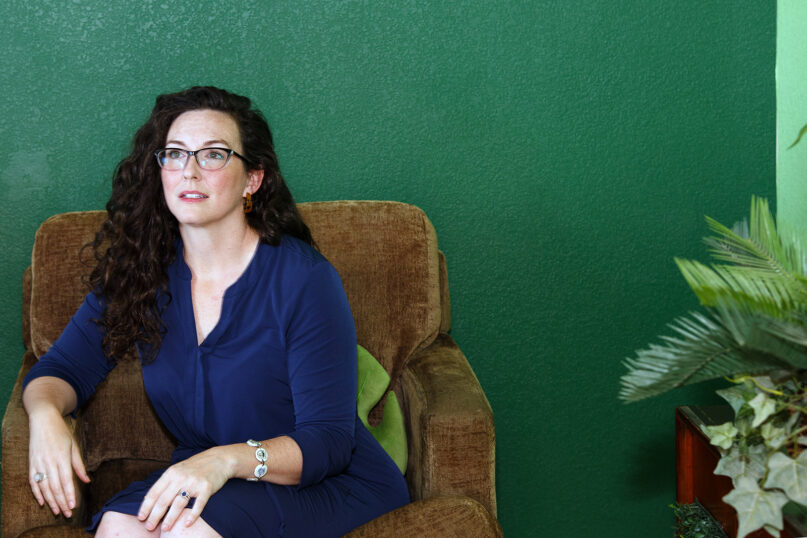
Sara Snapp listens at the Colorado Psychedelic Church, Friday, May 30, 2025, in Colorado Springs, Colo. (Photo by Jeremy Sparig, for CPR News)
“I found exactly what I needed here,” Snapp said. “I found the community that I was searching for. I found people who wanted to know the real me.”
For congregants like Snapp and Mead, Colorado Psychedelic Church doesn’t fit neatly into a box; it’s part support group, part spiritual sanctuary, part experiment.
“What makes this place magical is not the mushrooms,” Snapp said. “It’s that when you walk in that door, your armor falls off. And it’s in that softness and vulnerability that we … build these relationships.”
As one more weekly guidance session comes to a close, the sound of laughter and chatter fill the room.
“This is my family here,” said Mead, the Colorado transplant. “This is truly my third place.”
This story was produced through a collaboration between NPR and RNS. Listen to the radio version of the story.

